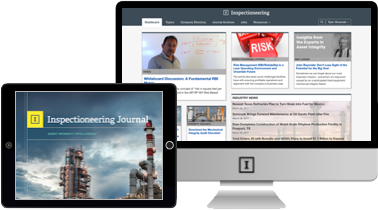Introduction
Every year more and more people are entering into the mechanical integrity (MI) field and obtaining API inspection certifications to become visual inspectors. With the lack of a formal and extensive training program for this discipline, one might start to ask a few questions:
- Why does someone decide to become an inspector?
- Is their decision financially driven or career driven?
- Did their previous job lead them down a path toward becoming an inspector?
- What is necessary to become an “outstanding” inspector, and do they possess the attributes, foundational knowledge, and experience to make it into the top tier of this profession?
Inspectors come from a wide range of occupational backgrounds. Some inspectors begin their careers as welders, while some start as boiler makers or pipe fitters. Some begin their careers as non-destructive examination (NDE) technicians, which in many cases, closely aligns with the skills needed to become a top quality inspector. Others come from different walks of life. Something to note is that an important aspect of a person’s previous work history is how they apply it when they become an API inspector. For example, a welder would understand what to look for during the fabrication/repair process. Someone with a background in operations would likely have an understanding of how units in facilities work with, connect with, and affect each other. These are all great skills to bring to the table.
Once one has decided to become an inspector, they will quickly notice that there is a lack of a formal and comprehensive training program. For other careers, such as engineering, the path is much more clearly mapped: decide which field you want to enter, chose a university that fits your needs, successfully navigate their curriculum over the course of four to five years, and graduate as an engineer. During this multi-year journey, engineers are taught the concepts and skills that will help them to be successful at their careers.
Unlike engineering and other careers, there is no formal map or degree plan for becoming a process industry facility inspector. One must create his or her own path. For most people, that path is paved with time spent trying to become familiar with numerous code books that could be used on any day, while working in another role. One has to seek out and find a number of scattered classes that cover topics such as corrosion, metallurgy, and other related topics in order to ensure they gain an understanding of the damaging forces at work in plant equipment, understand the inspector’s role in the plants, and have the ability to pass the API certification tests.



















Comments and Discussion
There are no comments yet.
Add a Comment
Please log in or register to participate in comments and discussions.